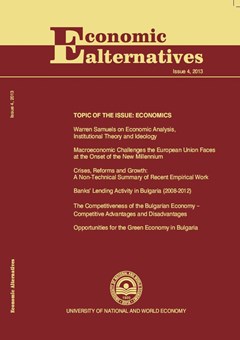Opportunities for the Green Economy in Bulgaria
Author: Vania Ivanova
Abstract
In the process of searching for new opportunities and models for the development of the Bulgarian economy in the post-crisis period, it has become even more obvious that we need a fundamental change in the existing conceptual framework. The existing model of economic growth, based on conventional manufacturing has to be transformed into a new much more resource-conservation one. Promoting ‘green’ manufacture could be the right response to this new challenge. The economic incentives stimulating towards launching a new model of green new deals aim to promote the creation of new green jobs, to establish energy-efficient production and clean technology. All this requires timely, adequate and responsible government policy. The active intervention of public authority requires a new distribution of the functions and competences between the private and public sectors keeping in mind the lessons learnt from the mistakes and omissions made so far. By analogy, ‘ecological’ capital should be created and developed along with human capital. This capital along with the existing couple of financial capital – new information and communication technologies (NICT) are to become the driving force of a new type of green economic deal. The target of the efficient macroeconomic policy for stimulating the development of green economy should be the establishment of a model of long term eco-friendly production on all markets and at all levels through a set of fiscal and regulatory measures. This new model should aim to accomplish a social benefit in the long term rather than maximizing company profits in the short run.

